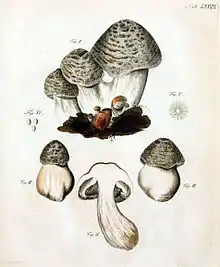| Tricholoma tigrinum | |
|---|---|
| Scientific classification | |
| Domain: | Eukaryota |
| Kingdom: | Fungi |
| Division: | Basidiomycota |
| Class: | Agaricomycetes |
| Order: | Agaricales |
| Family: | Tricholomataceae |
| Genus: | Tricholoma |
| Species: | T. tigrinum |
| Binomial name | |
| Tricholoma tigrinum | |
| Synonyms[1] | |
Tricholoma tigrinum is a gilled mushroom. First described under the name Agaricus tigrinus by Jacob Christian Schäffer in 1774,[2] the species was transferred to the genus Tricholoma in 1871 by Paul Kummer.[3]

Schäffer's 1762 illustration of Agaricus tigrinus
Schäffer's 1762 illustration of Agaricus tigrinus is now thought to represent Tricholoma pardinum (possibly due to an error) and some sources consider the name Tricholoma tigrinum to be a synonym of Tricholoma pardinum.[4][5] However the authoritative Species Fungorum database maintains Tricholoma tigrinum as a separate species[6] though nowadays the name could scarcely be used in practice in this independent sense and a modern definition of it is not available. See the Tricholoma pardinum article for more details of this story.
See also
References
- ↑ "Tricholoma tigrinum (Schaeff.) P. Kumm. 1871". MycoBank. International Mycological Association. Retrieved 2011-09-29.
- ↑ Schäffer JC. (1774). Fungorum qui in Bavaria et Palatinatu circa Ratisbonam nascuntur Icones (in Latin). Vol. 5. p. 35. The illustration is plate 89. In volume 1 a description is given in German and Latin without the scientific fungus name (the descriptions are ordered according to the plate numbers). Also a short Latin description with the name Agaricus tigrinus is given on page 35 of volume 5; that should be the original description of Tricholoma tigrinum.
- ↑ Kummer P. (1871). Der Führer in die Pilzkunde (in German) (1 ed.). p. 131.
- ↑ Knudsen, H.; Vesterholt, J., eds. (2018). Funga Nordica Agaricoid, boletoid, clavarioid, cyphelloid and gasteroid genera. Copenhagen: Nordsvamp. p. 498. ISBN 978-87-983961-3-0.
- ↑ "Tricholoma pardinum page". MushroomExpert.com web site. Kuo, M. Retrieved 2018-09-24.
- ↑ "Tricholoma tigrinum page". Species Fungorum. Royal Botanic Gardens Kew. Retrieved 2018-09-24.
This article is issued from Wikipedia. The text is licensed under Creative Commons - Attribution - Sharealike. Additional terms may apply for the media files.